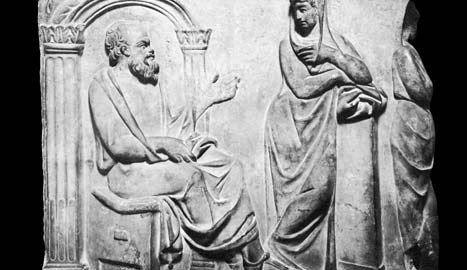Big Thought: To Be Human Is to Be Stuck Wandering for a Moment Between Two Abysses

So the best reason to read a “great book” is that you might learn a lot from it about who you are and what you’re supposed to do. In that spirt, I’m reading a variety of great books with two students this semester—Jacob Stubbs and Kristian Canler. The authors include Pascal, Leo Strauss, Allan Bloom, Martin Heidegger, Pierre Manent, Alexandre Kojeve, and Alexis de Tocqueville.
We’re not dwelling on what we might know through Biblical revelation. That’s above my pay grade or not my department as a mere professor of political science.
Instead, we’re thinking about psychological and political foundations accessible to anyone who has eyes to see.
I asked Jacob and Kristian to put together some propositions—claims about who we are—drawn from the great books. Here’s one of Jacob’s—with excellent supporting quotations full of evidence.
I’ll leave my commentary for later. But you can let me know if you think it’s true that each of us is a being stuck wandering between two abysses. If that is true, you’d have to admit that nothing is more wonderful than that wanderer. And you might moving in the direction of figuring out what the big point of a “liberal education” is.
Well, one comment: Pascal is known as a great (and rather fanatical) Christian thinker. But his psychological analysis below is not specifically Christian, but philosophical. And Alexis de Tocqueville, author of the best book on democracy and the best book on America, got a lot of his singular depth from his psychological debts to Pascal.
Jacob’s proposition:
Man is a being between two abysses:
Pascal: “Everyone should study their thoughts. They will find them all centered on the past or the future. We almost never think of the present, and if we do it is simply to shed some light on the future. The present is never our end. Past and present are our means, only the future is our end. And so we never actually live, though we hope to, and in constantly striving for happiness it is inevitable that we will never achieve it.”
Pascal: “The feeling of the inauthenticity of present pleasures and our ignorance of the emptiness of absent pleasures causes inconsistency.”
Pascal: “When I consider the short span of my life absorbed into the preceding and subsequent eternity, [like the memory of a one-day guest] the small space which I fill and even can see, swallowed up in the infinite immensity of spaces of which I know nothing and which knows nothing of me, I am terrified, and surprised to find myself here rather than there, for there is no reason why it should be here rather than there, why now rather than then. Who put me here? On whose orders and on whose decisions have this place and this time been allotted to me?”
Tocqueville: “I have only to consider myself: man comes from nothing traverses time, and is going to disappear forever into the bosom of God. One sees him for only a moment wandering, lost, between the limits of the two abysses.”





